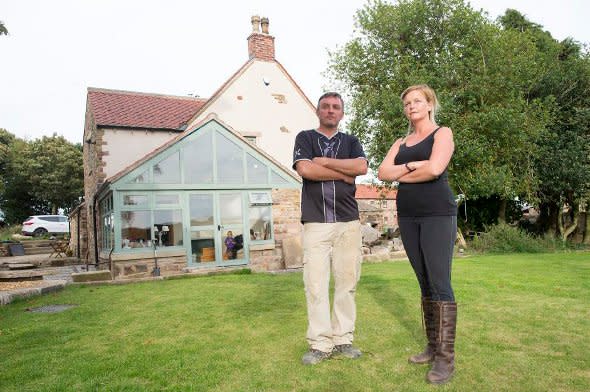Couple's incredible farmhouse restoration may be demolished under new rail plans

A couple who rebuilt a historic farmhouse stone by stone have been told it may be demolished to make way for the HS2 high speed railway.
Louise Nicholson, 43, and her husband Howard, 47, bought Grade II-listed Nickerwood Farm near Aston, South Yorkshire for £200,000 in 2012.
They then spent two years living in a caravan while they painstakingly renovated the property.
"It was completely derelict, falling down and about to collapse. I can't even tell you the pain we gave had doing this house," Mrs Nicholson tells the Daily Mail.
"We had to take it down piece by piece and number the stone so it all went back in exactly the same place."
Now, though, the couple have been told that their house falls in the path of a likely new route for HS2. Earlier this year, in an attempt to save money, plans for a new station in Meadowhall, just outside Sheffield, were scrapped.
Instead, the new proposal, estimated to save £1 billion, proposed a 'spur' into Sheffield city centre. This, though, means a new route running from Mansfield in Nottinghamshire, up to Wakefield, West Yorkshire, affecting homes and businesses in South Yorkshire.
"They didn't even know we existed. They just thought it was a stables," says Mrs Nicholson.
"We are completely powerless. No one can give us any answers. They don't care because it is a national thing."
The new route would affect many more people than the Nicholsons. In Mexborough, South Yorkshire, the 400 residents of a brand-new housing estate have been told that they may have to move. Meanwhile, 70 homes in Bramley may be destroyed.
And HS2 itself is increasingly coming under fire. Yesterday, the Adam Smith Institute branded the scheme 'economically irresponsible', saying it could end up costing £80 billion.
It will cost nine times as much per mile as high speed tracks in France, the right-wing think tank says in a report. And, it says, current occupancy levels on trains into and out of Euston are well below 50% outside commuting hours, meaning there's really no demand.
"Considerable publicity has been given to the relatively few minutes that will be saved in travelling between Birmingham and London and vice versa; a benefit that goes nowhere near to justifying such a huge cost," says the report.




